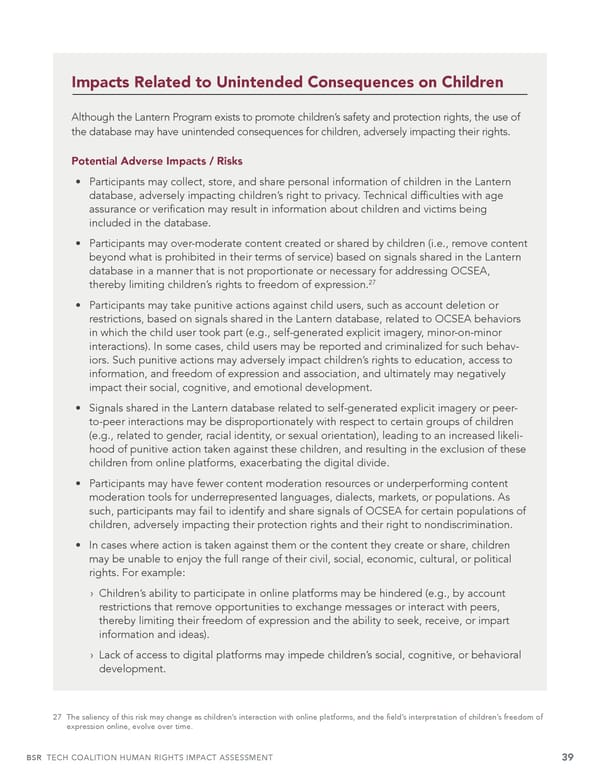Impacts Related to Unintended Consequences on Children Although the Lantern Program exists to promote children’s safety and protection rights, the use of the database may have unintended consequences for children, adversely impacting their rights. Potential Adverse Impacts / Risks • Participants may collect, store, and share personal information of children in the Lantern database, adversely impacting children’s right to privacy. Technical dif昀椀culties with age assurance or veri昀椀cation may result in information about children and victims being included in the database. • Participants may over-moderate content created or shared by children (i.e., remove content beyond what is prohibited in their terms of service) based on signals shared in the Lantern database in a manner that is not proportionate or necessary for addressing OCSEA, 27 thereby limiting children’s rights to freedom of expression. • Participants may take punitive actions against child users, such as account deletion or restrictions, based on signals shared in the Lantern database, related to OCSEA behaviors in which the child user took part (e.g., self-generated explicit imagery, minor-on-minor interactions). In some cases, child users may be reported and criminalized for such behav- iors. Such punitive actions may adversely impact children’s rights to education, access to information, and freedom of expression and association, and ultimately may negatively impact their social, cognitive, and emotional development. • Signals shared in the Lantern database related to self-generated explicit imagery or peer- to-peer interactions may be disproportionately with respect to certain groups of children (e.g., related to gender, racial identity, or sexual orientation), leading to an increased likeli- hood of punitive action taken against these children, and resulting in the exclusion of these children from online platforms, exacerbating the digital divide. • Participants may have fewer content moderation resources or underperforming content moderation tools for underrepresented languages, dialects, markets, or populations. As such, participants may fail to identify and share signals of OCSEA for certain populations of children, adversely impacting their protection rights and their right to nondiscrimination. • In cases where action is taken against them or the content they create or share, children may be unable to enjoy the full range of their civil, social, economic, cultural, or political rights. For example: › Children’s ability to participate in online platforms may be hindered (e.g., by account restrictions that remove opportunities to exchange messages or interact with peers, thereby limiting their freedom of expression and the ability to seek, receive, or impart information and ideas). › Lack of access to digital platforms may impede children’s social, cognitive, or behavioral development. 27 The saliency of this risk may change as children’s interaction with online platforms, and the 昀椀eld’s interpretation of children’s freedom of expression online, evolve over time. BSR TECH COALITION HUMAN RIGHTS IMPACT ASSESSMENT 39
 Tech Coalition Human Rights Impact Assessment of the Lantern Program Page 38 Page 40
Tech Coalition Human Rights Impact Assessment of the Lantern Program Page 38 Page 40